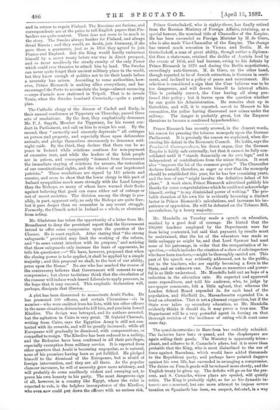A plot has been discovered to assassinate Arabi Pasha. He
has promoted 500 officers, and certain Circassians—six in number—who were omitted from his lists, with ten other officers in the same situation, determined to kill him, and proclaim Ismail Khedive. The design was betrayed, and its authors arrested, but the agitation in Cairo is very great. M. Gabriel Charmes, writing from Cairo, says the Egyptian Army is still not con- tented with its rewards, and will be greatly increased ; while all Europeans will gradually be dismissed, with compensations, or compelled to resign. The Khedive has been reduced to a nullity, and the Bedouins have been confirmed in all their privileges, especially exemption from military service. It is reported from other quarters that Arabi is becoming unpopular, as is natural, none of his promises having been as yet fulfilled. He pledged himself to the dismissal of the Europeans, but is afraid of foreign intervention, and they are all there. As the popular clamour increases, he will of necessity grow more arbitrary, and will probably do some needlessly violent and sweeping act, to prove his own honesty to his party. The most dangerous sign of all, however, in .a country like Egypt, where the ruler is expected to rule, is the helpless incompetence of the Khedive, who even now could put down the officers with no serious risk.
Prince Gortschakoff, who is eighty-three, has finally retired from the Russian Ministry of Foreign Affairs, retaining, as a special honour, the nominal title of Chancellor of the Empire. He has been succeeded as Foreign Minister by M. de Giers, who is also made Vice-Chancellor of the Empire. The change has caused much sensation in Vienna and Berlin. M. de Gortschakoff, a man of great ability, though rather a diploma- tist than a statesman, retained the dislike of Austria bred by the events of 1856, and had become, owing to his defeats by Prince Bismarck in 1870 and during the Berlin negotiations, exceedingly anti-German. M. de Giers, on the other hand, though reported to be of Jewish extraction, is German in senti- ment, and inclined to a policy of peace and recruitment. His selection is considered a sign that the Czar believes war to be too dangerous, and will devote himself to internal affairs. This is probably cornet, the Czar having all along pro- fessed this policy ; but it leaves open the question whether- he can guide his Administration. He remains shut up in Gatschina, and will, it is reported, march to Moscow to his coronation, the police having discovered new mines under the
The danger is probably great, but the Emperor threatens to become a confirmed hypochondriac.


































 Previous page
Previous page